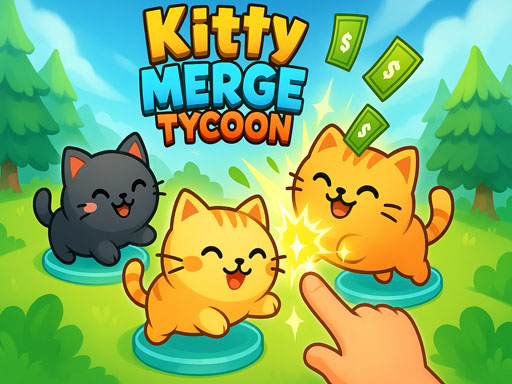Match Machine Logic
About Match Machine Logic
Okay, so you know how sometimes you’re just scrolling through new releases, maybe a little jaded, thinking you’ve seen it all, and then you stumble upon something that just… *clicks*? Like it reaches out of the screen and grabs your brain in the best possible way? That’s exactly what happened to me with this game, Match Machine Logic. Honestly, I’m still buzzing from my last session. I had to tell you about it, because I swear, this isn't just another puzzle game; it’s an experience, a journey into a surprisingly vibrant, almost meditative, world that just makes your brain hum with satisfaction.
I mean, the premise sounds simple enough, right? Triple match puzzle game. We’ve all played those. But what Match Machine Logic does, what it *really* does, is elevate it into something genuinely special. From the moment you load it up, you’re not just looking at a menu; you’re stepping into this incredible, bustling factory. And I’m not talking about some sterile, cold industrial complex. No, this factory is alive, it's a symphony of gentle whirs and soft clinks, a kaleidoscope of color. You can almost feel the smooth, polished surfaces of the conveyor belts, see the gleam on the little widgets and doodads as they roll by. It’s like a meticulously crafted miniature world, and you, my friend, are the master orchestrator of its flow.
The genius of it, for me, is how it immediately makes you feel important. You’re not just a player; you’re the "master matcher," the one keeping this whole beautiful, intricate operation running smoothly. And that’s a powerful feeling, honestly. There's a subtle pressure, a delightful sense of responsibility, that makes every match feel meaningful. You’re not just clearing items; you’re packing them up, ensuring the factory’s output, maintaining the rhythm. It's a dance, really, between your eyes, your brain, and your quick taps.
What I love about games like this is that initial sense of calm it instills. You start a level, and the board is laid out, a seemingly random array of vibrant items – little gears, shiny bolts, colorful circuit boards, tiny little robots even. And for a moment, you just breathe it in. You scan, you observe. This isn't a race against a clock, at least not initially. It’s an invitation to find order in chaos. You spot your first three identical items, you tap them, and *thunk-thunk-thunk* they vanish, cleared from the board, packed away with this incredibly satisfying sound effect that just resonates through your speakers. It's a small thing, but that auditory feedback, that *click* of success, is so perfectly tuned that it becomes almost addictive. You feel it in your bones, that little burst of dopamine.
But here’s where the "Logic" part of the title truly shines. Just when you think you’ve got the rhythm down, that it’s going to be a simple, relaxing clear-the-board affair, the levels start to get tricky. And I mean *tricky* in the best possible way. The layouts aren't just flat grids; they're architectural marvels. Items are stacked, hidden beneath layers, tucked away in corners, sometimes even moving on their own mini-conveyor belts within the main board. You’ll find yourself staring at a screen, your brain practically buzzing, trying to visualize the cascade, predicting which items will drop into place once you clear a path. It’s like a game of three-dimensional chess, but with adorable factory components.
The brilliant thing about this is that it never feels unfair. That initial calm gives way to a delightful mental workout. You start to develop strategies. Do I clear the top layer first to reveal what’s underneath? Or do I focus on a specific bottleneck that’s preventing new items from flowing in? You learn to anticipate, to plan several moves ahead. And when a strategy finally clicks into place, when you execute a series of matches that perfectly clears a difficult section, revealing a whole new set of possibilities, that’s where the real magic happens. That's the moment of pure, unadulterated satisfaction that only a well-designed puzzle game can deliver. You can almost feel the tension in your shoulders release, replaced by a triumphant grin.
And then, just when you’re facing a particularly gnarly layout, maybe a cluster of items that seems impossible to match, the game introduces power-ups. Now, I’ve always been drawn to games that give you tools, but tools that still require thought, not just a "win button." And Match Machine Logic nails this. You earn these power-ups, like a little hammer that can smash a single item, or a magnet that pulls all instances of one item type from the board. But the trick isn’t just *using* them; it’s knowing *when* and *where* to use them. A poorly timed hammer can be a wasted opportunity, but a perfectly placed one can unlock a cascade of matches that feels like you just cracked a secret code. It’s that moment of strategic brilliance, that "aha!" when you realize the optimal use of a power-up, that truly elevates the gameplay. It’s not about brute force; it’s about elegant problem-solving.
I remember one level, honestly, it had me stumped for a good ten minutes. There was this central column of items, completely surrounded, and I just couldn't see a way to get to them. My brain was whirring, trying every angle. I tried clearing the edges, hoping for a lucky drop, but nothing. The factory hummed on, almost taunting me. I was getting a little frustrated, I'll admit, but it was that good kind of frustration, the kind that makes victory sweeter. And then, it hit me. I had a special "swap" power-up, and I realized if I swapped *these two specific items* on opposite sides of the column, it would create a triple match, which would then open up a path for *another* match, and suddenly the whole column would be accessible. It was like watching a complex machine finally engage all its gears. The subsequent chain reaction was glorious, a symphony of *thunks* and *clinks*, and the board just melted away. That feeling, that surge of accomplishment, is why I play games. It’s why I’m telling you about this one.
In my experience, the best moments come when you lose yourself completely, when the outside world just fades away. And Match Machine Logic does that so effortlessly. You start a level, you get into that rhythm, your brain is engaged but not stressed, and suddenly you look up and an hour has vanished. It’s that perfect balance of challenge and relaxation. It’s the kind of game you can pick up for five minutes or five hours, and always feel like you’ve accomplished something, like you’ve brought order to a little corner of the universe.
The visual design, too, plays a huge part in this immersion. The items aren’t just generic shapes; they have personality. The factory itself evolves as you progress, with new backdrops, different types of machinery subtly changing the environment. You can almost smell the faint scent of oil and new plastic, hear the distant rumble of larger machines beyond your immediate workspace. It's a complete sensory package that draws you in and keeps you captivated.
What's interesting is how it manages to be both "relaxing" and "non-stop" at the same time. The "relaxing" part comes from the lack of a punishing timer in most modes, allowing you to think, to strategize. The "non-stop" comes from the sheer variety of levels and the constant, satisfying flow of clearing items. There's always something to do, always a new puzzle to unravel, always another layer to peel back. It's a continuous stream of delightful mental engagement.
Honestly, if you're looking for a game that respects your intelligence, that offers a genuine sense of accomplishment, and that can just melt away the stresses of the day with its charming aesthetic and deeply satisfying gameplay loop, you absolutely have to try Match Machine Logic. It's not just a game; it's a little factory of joy, a masterclass in puzzle design that will have your brain purring with contentment. Just wait until you encounter some of the later levels, where the entire board seems to shift and reconfigure with every match. The real magic happens when you realize you're not just playing a game; you're conducting an orchestra of logic and color. You’ll be leaning forward in your chair, I promise you, ready to tap that next perfect match.
I mean, the premise sounds simple enough, right? Triple match puzzle game. We’ve all played those. But what Match Machine Logic does, what it *really* does, is elevate it into something genuinely special. From the moment you load it up, you’re not just looking at a menu; you’re stepping into this incredible, bustling factory. And I’m not talking about some sterile, cold industrial complex. No, this factory is alive, it's a symphony of gentle whirs and soft clinks, a kaleidoscope of color. You can almost feel the smooth, polished surfaces of the conveyor belts, see the gleam on the little widgets and doodads as they roll by. It’s like a meticulously crafted miniature world, and you, my friend, are the master orchestrator of its flow.
The genius of it, for me, is how it immediately makes you feel important. You’re not just a player; you’re the "master matcher," the one keeping this whole beautiful, intricate operation running smoothly. And that’s a powerful feeling, honestly. There's a subtle pressure, a delightful sense of responsibility, that makes every match feel meaningful. You’re not just clearing items; you’re packing them up, ensuring the factory’s output, maintaining the rhythm. It's a dance, really, between your eyes, your brain, and your quick taps.
What I love about games like this is that initial sense of calm it instills. You start a level, and the board is laid out, a seemingly random array of vibrant items – little gears, shiny bolts, colorful circuit boards, tiny little robots even. And for a moment, you just breathe it in. You scan, you observe. This isn't a race against a clock, at least not initially. It’s an invitation to find order in chaos. You spot your first three identical items, you tap them, and *thunk-thunk-thunk* they vanish, cleared from the board, packed away with this incredibly satisfying sound effect that just resonates through your speakers. It's a small thing, but that auditory feedback, that *click* of success, is so perfectly tuned that it becomes almost addictive. You feel it in your bones, that little burst of dopamine.
But here’s where the "Logic" part of the title truly shines. Just when you think you’ve got the rhythm down, that it’s going to be a simple, relaxing clear-the-board affair, the levels start to get tricky. And I mean *tricky* in the best possible way. The layouts aren't just flat grids; they're architectural marvels. Items are stacked, hidden beneath layers, tucked away in corners, sometimes even moving on their own mini-conveyor belts within the main board. You’ll find yourself staring at a screen, your brain practically buzzing, trying to visualize the cascade, predicting which items will drop into place once you clear a path. It’s like a game of three-dimensional chess, but with adorable factory components.
The brilliant thing about this is that it never feels unfair. That initial calm gives way to a delightful mental workout. You start to develop strategies. Do I clear the top layer first to reveal what’s underneath? Or do I focus on a specific bottleneck that’s preventing new items from flowing in? You learn to anticipate, to plan several moves ahead. And when a strategy finally clicks into place, when you execute a series of matches that perfectly clears a difficult section, revealing a whole new set of possibilities, that’s where the real magic happens. That's the moment of pure, unadulterated satisfaction that only a well-designed puzzle game can deliver. You can almost feel the tension in your shoulders release, replaced by a triumphant grin.
And then, just when you’re facing a particularly gnarly layout, maybe a cluster of items that seems impossible to match, the game introduces power-ups. Now, I’ve always been drawn to games that give you tools, but tools that still require thought, not just a "win button." And Match Machine Logic nails this. You earn these power-ups, like a little hammer that can smash a single item, or a magnet that pulls all instances of one item type from the board. But the trick isn’t just *using* them; it’s knowing *when* and *where* to use them. A poorly timed hammer can be a wasted opportunity, but a perfectly placed one can unlock a cascade of matches that feels like you just cracked a secret code. It’s that moment of strategic brilliance, that "aha!" when you realize the optimal use of a power-up, that truly elevates the gameplay. It’s not about brute force; it’s about elegant problem-solving.
I remember one level, honestly, it had me stumped for a good ten minutes. There was this central column of items, completely surrounded, and I just couldn't see a way to get to them. My brain was whirring, trying every angle. I tried clearing the edges, hoping for a lucky drop, but nothing. The factory hummed on, almost taunting me. I was getting a little frustrated, I'll admit, but it was that good kind of frustration, the kind that makes victory sweeter. And then, it hit me. I had a special "swap" power-up, and I realized if I swapped *these two specific items* on opposite sides of the column, it would create a triple match, which would then open up a path for *another* match, and suddenly the whole column would be accessible. It was like watching a complex machine finally engage all its gears. The subsequent chain reaction was glorious, a symphony of *thunks* and *clinks*, and the board just melted away. That feeling, that surge of accomplishment, is why I play games. It’s why I’m telling you about this one.
In my experience, the best moments come when you lose yourself completely, when the outside world just fades away. And Match Machine Logic does that so effortlessly. You start a level, you get into that rhythm, your brain is engaged but not stressed, and suddenly you look up and an hour has vanished. It’s that perfect balance of challenge and relaxation. It’s the kind of game you can pick up for five minutes or five hours, and always feel like you’ve accomplished something, like you’ve brought order to a little corner of the universe.
The visual design, too, plays a huge part in this immersion. The items aren’t just generic shapes; they have personality. The factory itself evolves as you progress, with new backdrops, different types of machinery subtly changing the environment. You can almost smell the faint scent of oil and new plastic, hear the distant rumble of larger machines beyond your immediate workspace. It's a complete sensory package that draws you in and keeps you captivated.
What's interesting is how it manages to be both "relaxing" and "non-stop" at the same time. The "relaxing" part comes from the lack of a punishing timer in most modes, allowing you to think, to strategize. The "non-stop" comes from the sheer variety of levels and the constant, satisfying flow of clearing items. There's always something to do, always a new puzzle to unravel, always another layer to peel back. It's a continuous stream of delightful mental engagement.
Honestly, if you're looking for a game that respects your intelligence, that offers a genuine sense of accomplishment, and that can just melt away the stresses of the day with its charming aesthetic and deeply satisfying gameplay loop, you absolutely have to try Match Machine Logic. It's not just a game; it's a little factory of joy, a masterclass in puzzle design that will have your brain purring with contentment. Just wait until you encounter some of the later levels, where the entire board seems to shift and reconfigure with every match. The real magic happens when you realize you're not just playing a game; you're conducting an orchestra of logic and color. You’ll be leaning forward in your chair, I promise you, ready to tap that next perfect match.
Enjoy playing Match Machine Logic online for free on Qotori games. This Puzzle game offers amazing gameplay and stunning graphics. No downloads required, play directly in your browser!
How to Play
Mouse click or tap to play





Comments
This game is awesome! I love the graphics and gameplay.
One of the best games I've played recently. Highly recommended!